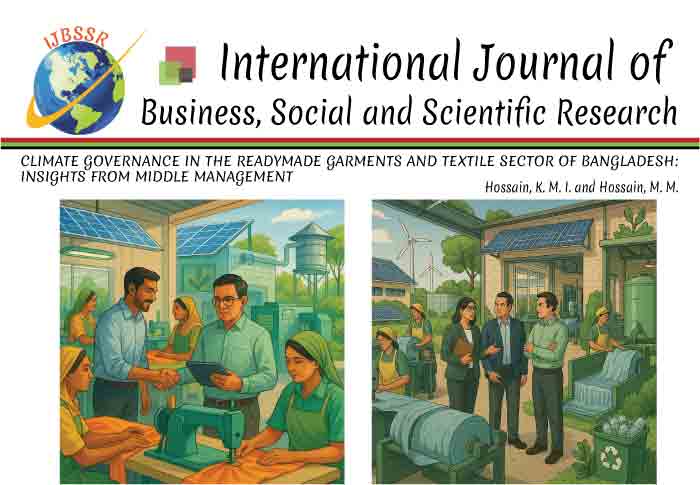CLIMATE GOVERNANCE IN THE READYMADE GARMENTS AND TEXTILE SECTOR OF BANGLADESH: INSIGHTS FROM MIDDLE MANAGEMENT

DOI: http://doi.org/10.55706/ijbssr13201
Ready-Made Garments (RMG) and textile sector in Bangladesh contributing
approximately 83% of the country's total export earnings and employing over four million workers,
is increasingly vulnerable to climate change. Adverse impacts such as rising temperatures,
heatwaves, water scarcity, and flooding are increasingly disrupting production,
reducing worker productivity, and destabilizing supply chains. While several
studies have explored sectoral vulnerabilities, the perceptions of
factory-level middle management, those responsible for implementing compliance,
CSR, and sustainability mandates remain largely overlooked. This study
addresses that gap through a structured survey of 165 middle management
professionals across the RMG sector in Bangladesh. The questionnaire comprised
15 Likert-scale items across three themes: perceived climate impacts,
adaptation strategies, and mitigation efforts. Descriptive statistical analysis
revealed strong concern over operational disruptions (mean = 4.11) and
heat-related risks (mean = 4.07), while preparedness measures such as emergency
response were more developed than longer-term resilience strategies (mean =
3.68–3.84). Mitigation efforts, especially those influenced by buyer pressure,
were widely acknowledged (mean = 4.46), though technical, financial, and
institutional barriers hinder broader implementation. The study underscores the
pivotal role of middle management in climate response and calls for targeted
capacity building, stronger institutional frameworks, and inclusive policy
approaches. By focusing on factory-level insights, this research contributes
operationally grounded evidence to the broader discourse on industrial climate
resilience in developing economies.

